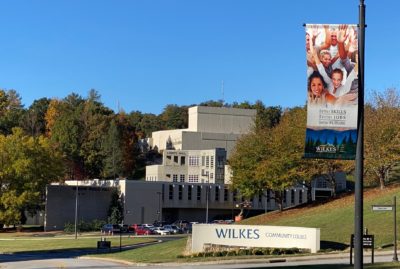

|
|
This series takes a look at the role community colleges can play in economic development.
- This community college created a playbook other colleges can use to establish a student success center with a goal of doubling the graduation rate.
- This community college co-founded a nonprofit to bring higher-paying jobs to the region and is building spaces for workers to come together, revitalizing downtowns.
- This community college is working with a taskforce to connect workers to high-quality, affordable child care, allowing them to stay in the region to work.
With this strategic focus on economic mobility for students, economic prosperity for workers and employers, and economic impact for the region, the future of work is happening right now in Wilkes County.
Out in the northwest corner of our state, a nonprofit is positioning Wilkes, Ashe, and Alleghany counties to be a hub for rural tech workers in partnership with Wilkes Community College, Per Scholas, and the Herring Family Foundation. Zach Barricklow — who presciently told statewide leaders just before the pandemic that telework was our future — took on the role of being the first executive director of NC Tech Paths while also working at the community college.
The nonprofit helps employers by connecting them to well-trained tech talent, and it provides a pathway to high-growth, high-paying jobs for students.
The first cohort of students trained to become software engineers. Sixteen students started the 15-week program. Ten students graduated, and 10 were placed in jobs with Inmar Intelligence or Lowes. The average income prior to training was $32,000, and the average income after training was $55,000, a 72% increase. Salaries for those who stay in the jobs more than 90 days will increase.
The second cohort of students trained to learn IT support. All 12 of the participants graduated. Of those graduates, 11 were placed in jobs with Lowe’s (one graduate postponed joining the workforce to start a family). The average salary prior to training was $27,000, and post-training it was $47,000, a 74% increase.
A third cohort of 24 students is now in training also to learn IT support.
The training is free and includes a stipend for costs of living during training — $5,500 for the first cohort and $4,500 for the second cohort — is provided to students.
Barricklow said the cohorts have been diverse across age (mid-20s to mid-60s), race and ethnicity, gender, and educational background. The living stipends, he said, are critical.
“That is what opened it up,” he said. “From an equity standpoint, that’s what allowed this to be available to folks currently in low-income jobs or who may be the primary wage earner in their household.”
The graduates remain in the counties they live in, and the employers must agree to allow them to work remotely. NC Tech Paths is paid a placement fee by the employers. This earned revenue helps the nonprofit cover the cost of future cohorts it sponsors through the partnership with Per Scholas and Wilkes Community College.
But increasing the economic prosperity of students turned workers is just the beginning.
What is an RTO?
RTO stands for rural tech outpost. Here is the definition:
A Rural Tech Outpost (“RTO”) is a modern coworking facility created and operated by NC Tech Paths to provide professional work, meeting, and community-building spaces for companies large and small, as well as local freelancers, remote employees, and entrepreneurs. Our RTOs will combine traditional coworking space and amenities, including community event space, with company-sponsored pods to house teams of technology talent.
The working mission statement for the RTO is “equipping our rural neighbors with modern spaces and tools necessary for convening, learning, and collaborating in the global digital economy while contributing to the local Main Street economy.”
Barricklow wants all of this — from supporting student success to connecting workers to tech jobs — to lead to community economic development by revitalizing the downtowns and local economies of northwest North Carolina.
NC Tech Path’s first RTO will be at 711 Main Street in North Wilkesboro, and it is scheduled to open this month.
A press release said, “The building, named ‘The Masthead‘ in recognition of the building having served as the longtime home to The Wilkes Journal-Patriot newspaper, is scheduled to open in fall 2022. It will house more than 80 technology workers, entrepreneurs, and other professionals, as well as provide modern teleconference suites and community meeting space. A significant portion of those individuals will be graduates from technology education programs sponsored by NC Tech Paths to provide economic mobility for residents of Wilkes County.”
There will be “company pods” for employer partners of NC Tech Paths, allowing corporations from around the world to have a presence in smaller towns.
And Doren Tripp, the community manager for The Masthead, said, “my goal is to create a space that … incentivizes those in the space to walk down the streets, pouring into the economy and ‘keeping it local.’”
NC Tech Paths’ second RTO will redevelop a vacant site where there used to be a furniture factory, turning it into a live-work-play district on the banks of a local river.
The press release said the 30,000 to 40,000 square foot space will include hybrid workspace and a makerspace for children and adults in the community to experience learning and collaboration in STEM fields.
Next in the series: Connecting workers to high-quality, affordable child care allowing them to stay in the region was the next step for this community.



